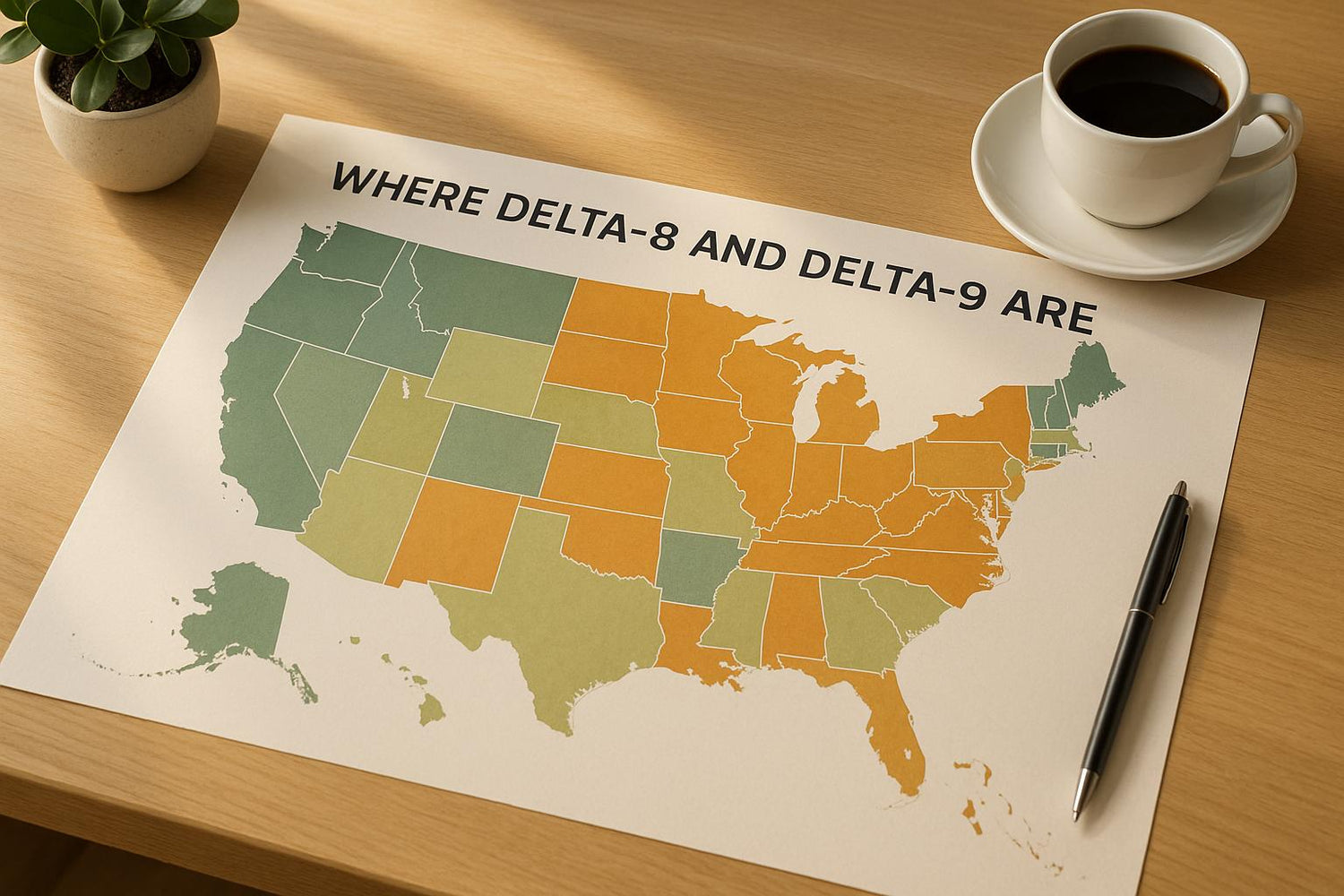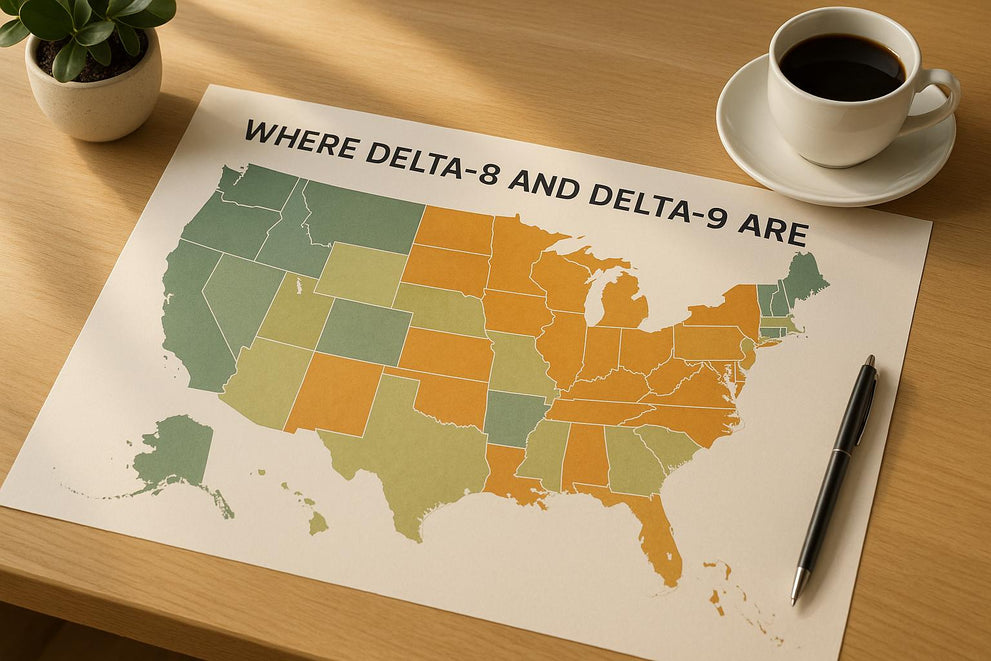Delta-8 THC and Delta-9 THC are cannabinoids found in cannabis, but their legal status depends on where you live. Here's what you need to know in 2025:
- Delta-8 THC: Legal federally if derived from hemp, but banned or restricted in 20 states, including New York, Colorado, and Alaska. States like Florida are tightening regulations.
- Delta-9 THC: Legal federally if hemp-derived and under 0.3% THC. Recreational use is allowed in 24 states, medical use in 39 states, but fully illegal in 11 states like Idaho and Wyoming.
Quick Comparison
| Aspect | Delta-8 THC | Delta-9 THC |
|---|---|---|
| Effects | Milder psychoactive effects | Stronger psychoactive effects |
| Federal Status | Legal if hemp-derived | Legal if <0.3% from hemp |
| State Regulation | Banned/restricted in 20 states | Recreational in 24, medical in 39 |
| Sales Channels | Retail and online (where legal) | Licensed dispensaries only |
| Age Restrictions | Generally 21+ | 21+ recreational, 18+ medical |
Key Takeaways
- Check State Laws: Regulations vary widely by state and change often.
- Buy Tested Products: Look for third-party lab results to confirm safety and compliance.
- Stay Informed: Transporting THC across state lines is federally illegal.
Understanding these laws is crucial for staying compliant and making informed choices.
Are Delta 8 THC and Delta 9 THC Legal
1. Delta-8 THC Laws
Navigating Delta-8 THC laws in 2025 is no easy task, with federal and state regulations painting a complicated picture. Federally, Delta-8 THC derived from hemp is still permitted under the 2018 Farm Bill, as long as products contain less than 0.3% Delta-9 THC. However, state laws vary widely, creating a patchwork of rules across the U.S.
As of April 2025, twenty states have either banned Delta-8 THC or imposed strict regulations. Here's a breakdown of states with restrictions:
| Region | States with Delta-8 Restrictions |
|---|---|
| West | Alaska, Colorado, Montana, Nevada, Oregon, Washington |
| Northeast | Massachusetts, New Hampshire, New York, Rhode Island, Vermont |
| Midwest | Iowa, Kansas, North Dakota |
| South | Delaware, Mississippi, West Virginia |
| Other | Hawaii, Idaho, Utah |
Florida stands out with its recent legislative effort to tighten controls. The Florida Senate passed SB 438, a bill designed to impose stricter regulations on Delta-8 products. This move was fueled by alarming findings from a Lakeland testing lab, which revealed that 94% of hemp flower samples from local smoke shops had Delta-9 THC levels exceeding the legal limit. Senator Gayle Harrell has voiced concerns about the intoxicating effects of these products, emphasizing the need for consumer education.
In states where Delta-8 remains legal, regulations are still stringent. Authorities enforce age restrictions, require thorough product testing, mandate clear labeling, and demand proper documentation from retailers. Adding to the complexity, the DEA classifies synthetic THC as a Schedule I substance, further complicating enforcement.
Texas, for example, currently allows hemp-derived Delta-8 but is actively reviewing potential restrictions. The state has ramped up laboratory testing to better distinguish Delta-8 from Delta-9 THC. This increased scrutiny highlights the importance of choosing products that have been lab-tested to confirm cannabinoid levels and ensure they are free from harmful contaminants.
2. Delta-9 THC Laws
Delta-9 THC laws are a maze of federal restrictions and state-specific regulations. Federally, Delta-9 THC is still classified as a Schedule I controlled substance, meaning it’s considered illegal at the national level. However, state laws paint a different picture, with a growing number of states allowing its use in various forms.
Currently, 39 states permit medical use, while 24 states also allow recreational consumption.
| Category | Number of States | Key Requirements |
|---|---|---|
| Recreational Legal | 24 | Must be 21 or older, buy from licensed retailers, adhere to possession limits |
| Medical Only | 15 | Requires medical card, qualifying conditions, and purchases from registered dispensaries |
| Fully Prohibited | 11 | No legal access; possession carries criminal penalties |
States that allow recreational use provide the most freedom, typically offering higher possession limits and a wider variety of product options.
In medical-only states, regulations are stricter. Patients must:
- Get a physician’s recommendation.
- Register with state medical cannabis programs.
- Hold a valid medical cannabis card.
- Purchase products exclusively from state-approved dispensaries.
For the 11 states where Delta-9 THC is fully prohibited - like Idaho and Wyoming - the penalties are harsh. In Idaho, even small amounts can lead to up to a year in jail and a $1,000 fine. Wyoming enforces similar penalties, with possession under 3 ounces treated as a misdemeanor.
States with legal markets enforce strict rules to ensure safety and transparency. These include:
- Third-party lab testing to verify product quality.
- Child-resistant packaging to prevent accidental consumption.
- Clear potency labeling to inform consumers.
- Seed-to-sale tracking to monitor the product lifecycle.
Potency limits are another common regulation, especially for edibles. These are often capped at 5–10 mg per serving and 50–100 mg per package. Medical-only states typically impose even stricter potency limits to prioritize therapeutic use while minimizing psychoactive effects.
Additionally, 15 states offer some form of medical cannabis reciprocity. This means out-of-state patients may have their medical cannabis cards recognized, though the level of access varies - from full purchasing rights to possession-only allowances.
It’s also important to note that transporting Delta-9 THC across state lines remains federally illegal. This creates significant challenges for consumers and businesses, highlighting the ongoing tension between federal law and state legalization efforts.
sbb-itb-0d19bd1
Benefits and Limitations
Delta-8 and Delta-9 THC each bring their own advantages and challenges for both consumers and businesses in 2025.
Delta-8 THC has found a niche in the market, partly due to its broader accessibility under the 2018 Farm Bill. However, this advantage is tempered by bans in over 20 states, creating a patchwork of regulations that directly affect compliance and consumer safety standards. The constantly shifting legal landscape means businesses must stay vigilant to meet evolving requirements.
Here's a quick comparison of compliance factors:
| Aspect | Delta-8 THC | Delta-9 THC |
|---|---|---|
| Testing Requirements | Varies by state | Comprehensive testing mandated |
| Age Restrictions | Generally 21+ | 21+ recreational; 18+ medical |
| Sales Channels | Retail stores and online where legal | Licensed dispensaries only |
| Interstate Commerce | Allowed when compliant | Prohibited |
| Quality Control | Subject to varied oversight | Strict state oversight |
States like Florida are stepping up regulations for Delta-8 products, requiring certified lab testing, clear labeling, age verification systems, and strict advertising rules. This tightening of standards reflects a growing focus on consumer safety and product transparency.
On the other hand, Delta-9 THC benefits from a more established regulatory framework in states where it’s legal. This means consumers can expect consistent quality, clear protections, and regulated distribution. But the federal Schedule I classification of Delta-9 creates significant hurdles, particularly for interstate commerce and banking services.
Michigan provides an example of balanced regulation. The state allows Delta-8 THC but enforces strict testing and labeling requirements, aligning them closely with those for Delta-9 products. Businesses operating in this space must navigate two distinct regulatory paths: Delta-9 THC's well-defined structure and Delta-8 THC's still-developing rules.
Conclusion
As of 2025, the legal status of Delta-8 and Delta-9 THC is shaped by federal guidelines and a maze of state-specific laws. Under the 2018 Farm Bill, hemp-derived Delta-9 THC products with less than 0.3% THC by dry weight remain federally legal, though state regulations create a complex web of restrictions and requirements.
For Delta-9 THC, recreational use is now allowed in 24 states, while 39 states permit it for medical purposes as of April 2025. Delta-8 THC, however, faces stricter oversight, with 19 states either banning or heavily regulating its use. States like Michigan, Alabama, and Louisiana have opted for stringent testing and labeling rules to enhance consumer safety.
Navigating these regulations requires careful attention. Here's what consumers should keep in mind:
- Know Your State Laws: Regulations differ greatly from state to state and can change frequently, so staying informed is essential.
- Buy Tested Products: Always opt for products that come with third-party lab results to verify safety and compliance.
- Follow Age Restrictions: Most states set a minimum age of 21 for recreational use, so check local requirements.
For those seeking compliant products, Diet Smoke offers lab-tested THC options that meet federal standards. Each product comes with QR-coded certificates to confirm adherence to the 0.3% THC limit. To stay informed and compliant, regularly review state regulations and consult cannabis regulatory agencies.
Lastly, remember that transporting THC products across state lines remains illegal.
FAQs
How can I make sure the Delta-8 or Delta-9 THC products I buy meet federal and state laws?
To make sure you're buying Delta-8 or Delta-9 THC products that align with federal and state laws, always opt for products that are lab-tested. Lab testing confirms the THC content and ensures the product stays within legal limits - like the federal requirement of less than 0.3% Delta-9 THC by dry weight.
It's also important to review your state's specific regulations on Delta-8 and Delta-9 THC. Laws can differ significantly, with some states imposing stricter controls or outright bans. Staying informed about local rules is key before making any purchases.
What happens if I travel across state lines with Delta-8 or Delta-9 THC products?
Transporting Delta-8 or Delta-9 THC products across state lines can land you in legal trouble, even if these products are allowed in your home state. Federal law still categorizes Delta-9 THC as a controlled substance, and the legal status of Delta-8 THC differs from state to state. Crossing into a state where these products are banned could result in fines or other penalties.
To avoid any issues, make sure to thoroughly check the laws in both your state and the state you’re traveling to. Staying informed and following local and federal rules is the best way to steer clear of legal complications.
What are the differences in testing and labeling requirements for Delta-8 THC and Delta-9 THC in states where both are legal?
Testing and labeling rules for Delta-8 THC and Delta-9 THC can vary widely depending on where you are. In states where these products are allowed, they usually have to pass strict checks for things like potency, purity, and overall safety. This often involves lab tests to screen for contaminants such as pesticides, heavy metals, and leftover solvents, along with confirming the exact THC levels.
When it comes to labeling, most states require clear and detailed information. This typically includes the THC content, serving sizes, and a full list of ingredients. In some cases, especially with Delta-8 THC products, additional warnings or disclaimers may be required due to its synthetic nature. To stay compliant and ensure safety, always review your state’s specific rules.





